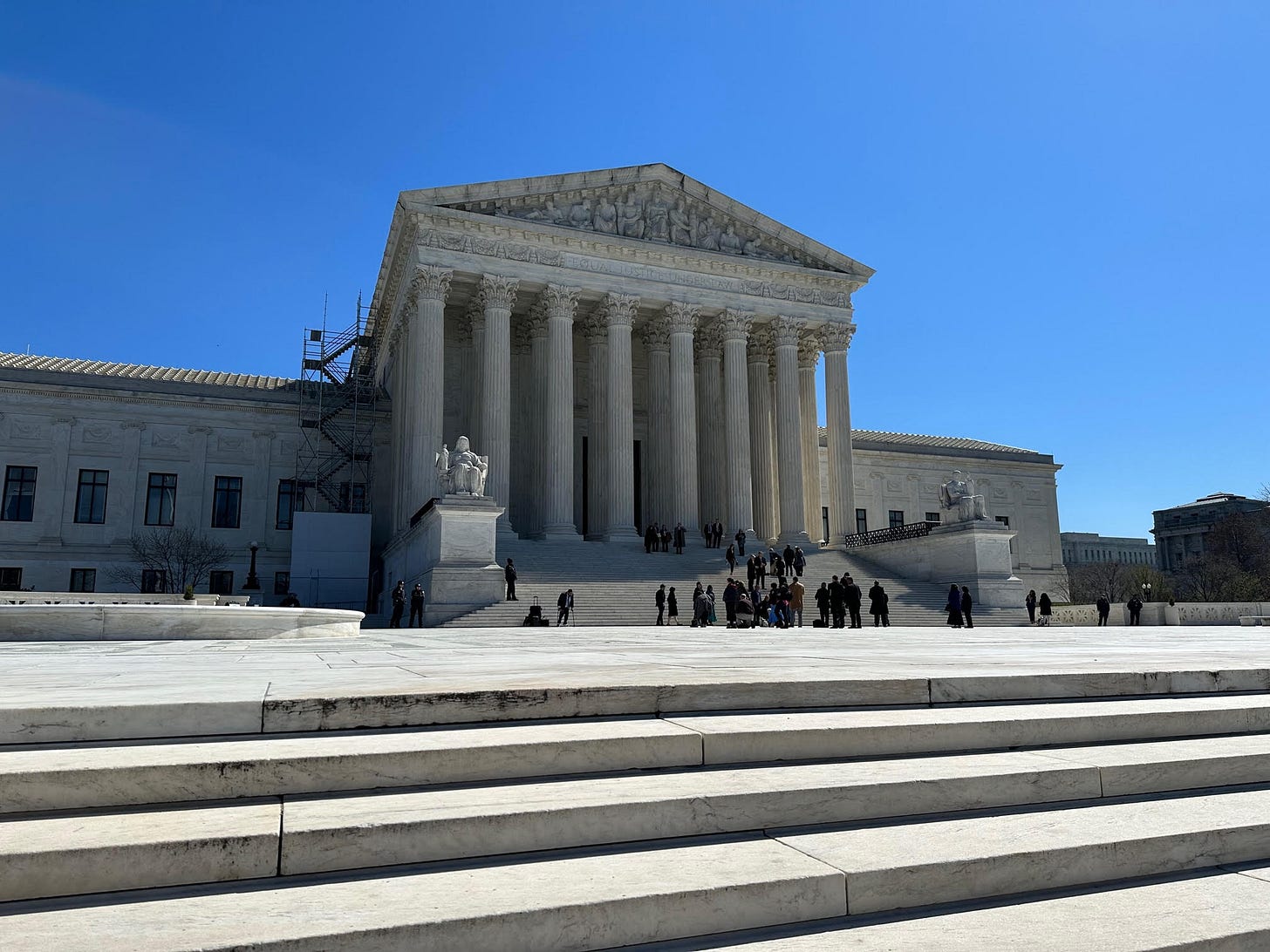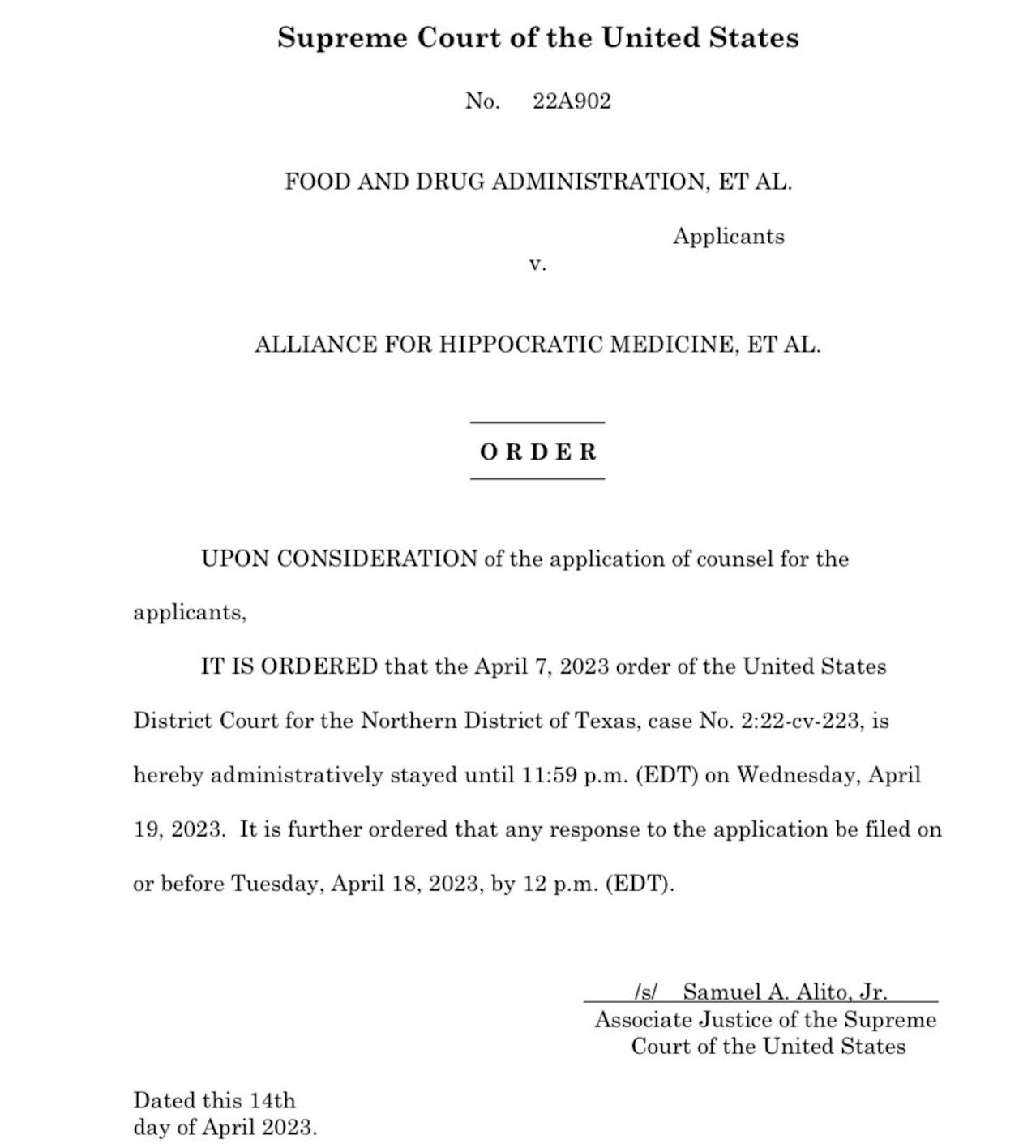Alito issues "administrative stay," keeping medication abortion ruling on hold for now
The district court's order will remain on hold through 11:59 p.m. ET Wednesday, April 19, under Alito’s order. Expect another Supreme Court ruling in the mifepristone case before then.
Update, 4:30 p.m.: Less than 10 hours before a district court order was to go into effect that could have upended medication abortion in the United States, a temporary, “administrative stay” from Justice Samuel Alito put the question off for five days — presumably, in part, to give the full Supreme Court time to consider the matter.
Earlier in the day Friday, the Biden administration and a drugmaker asked the U.S. Supreme Court to stop the ruling from U.S. District Judge Matthew Kacsmaryk in Texas — which is aimed at halting the approval of and eased access to mifepristone across the nation — from going into effect. The limits on eased access had been slated to go into effect at midnight CT/1 a.m. ET.
Alito, as the justice who hears applications out of the U.S. Court of Appeals for the Fifth Circuit, issued administrative stays in both requests — halting the district court’s order from going into effect at all tonight.
The district court’s order will remain on hold through 11:59 p.m. ET Wednesday, April 19, under Alito’s administrative stays issued in both requests. Any response to the Biden administration or drugmaker’s requests are due to be filed with the Supreme Court by noon Tuesday.
As such, expect further Supreme Court action — likely a ruling from the full court or extension of the administrative stay — before then.
This is not — and should not be seen as — a ruling on either the merits of the case or even DOJ and Danco’s requests for a stay pending appeal. This is an administrative stay, as Alito wrote, and he very well could rule differently on the stay request (or the merits of the appeal).
The Justice Department’s filing at the high court requesting the stay harshly criticized at the “unprecedented” April 7 order from U.S. District Judge Matthew Kacsmaryk in Texas purporting to halt approval of mifepristone after 23 years and the Wednesday night ruling from the U.S. Court of Appeals for the Fifth Circuit that “transformed” the case “just 48 hours before the district court’s order is set to take effect.”
Under the Fifth Circuit’s ruling, Kacsmaryk’s order halting the 2000 approval is stayed pending appeal — meaning mifepristone is still approved — but Kacsmaryk’s order halting all of the decisions by the U.S. Food and Drug Administration since then to ease access to the drug remain in effect — meaning the eased restrictions would not apply as of 1 a.m. ET. Those eased restrictions include the recent decision ending the in-person dispensing requirement.
“If allowed to take effect, the lower courts’ orders would upend the regulatory regime for mifepristone, with sweeping consequences for the pharmaceutical industry, women who need access to the drug, and FDA’s ability to implement its statutory authority,” DOJ lawyers wrote.
Danco Laboratories, the maker of Mifeprex, wrote in their request at the Supreme Court that the Fifth Circuit’s partial stay ruling would mean that “a series of extensive approvals” would be needed before Danco could “legally market and distribute mifepristone.”
Both the Justice Department and Danco also suggested that, if necessary, the justices consider taking up the case immediately on its merits, consider it on an extremely expedited basis, and issue a decision this term — which would, generally, mean by the end of June.
Of the ramification of the rulings, should they be allowed to stand, the drugmakers argued, “[T]hese paradigm-shifting holdings inject confusion, uncertainty, and expense into the regulation of an industry that plays a foundational role in the health and safety of millions of Americans.”
Or, as DOJ put it, the request at the Supreme Court “concerns unprecedented lower court orders countermanding FDA’s scientific judgment and unleashing regulatory chaos by suspending the existing FDA-approved conditions of use for mifepristone.”
In addition to all of this is the matter of the case brought in Washington state by Democratic attorneys general of 17 states and Washington, D.C. Under an order in that case, which U.S. District Judge Thomas Rice clarified on Thursday, mifepristone is to remain available in the 17 states and DC under the FDA’s rules as January 2023 — meaning rules with the eased restrictions. In his clarification, Rice stated that, because Kacsmaryk’s order was on hold until April 15, he had jurisdiction over the parties (including the FDA) and his ruling applies “irrespective” of any decision from the Texas court or Fifth Circuit.
The rulings from Kacsmaryk and the Fifth Circuit have “created regulatory chaos across the country,” Danco’s lawyers wrote — a phrase that appears in both filings. With the Washington ruling added in, they argued, “The result is an untenable limbo, for Danco, for providers, for women, and for health care systems all trying to navigate these uncharted waters ….”
“The course of this litigation has been troubling at every level,” the DOJ lawyers wrote. “Issues of such imperative public importance should not be litigated in this manner. This Court should stay the district court’s opinion in full and maintain the long-settled status quo pending the completion of orderly appellate review.”
Both DOJ and Danco ask the justices, at the least, to issue an administrative stay temporarily while the Supreme Court can consider their requests.
This is a developing story. Check back at Law Dork for the latest.





The filing, aside from its brilliant BS-dissolving argument, is remarkable for being set in Courier 10 font. Don’t see that often.
I have a question: The Kacsmaryk order also clearly creates fetal personhood, referring specifically throughout to fetuses as humans and communicating specifically that a person's age begins at conception: "The drugs were limited to women and girls with unborn children aged seven-weeks gestation or younger."
Are we all now 9 months older than it says on our drivers' licenses? Even if there is a stay or reversal on the FDA language, doesn't this order completely change what it means to be a person?